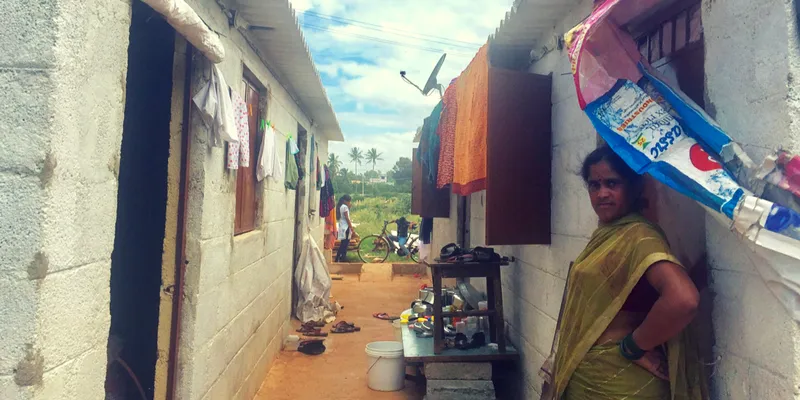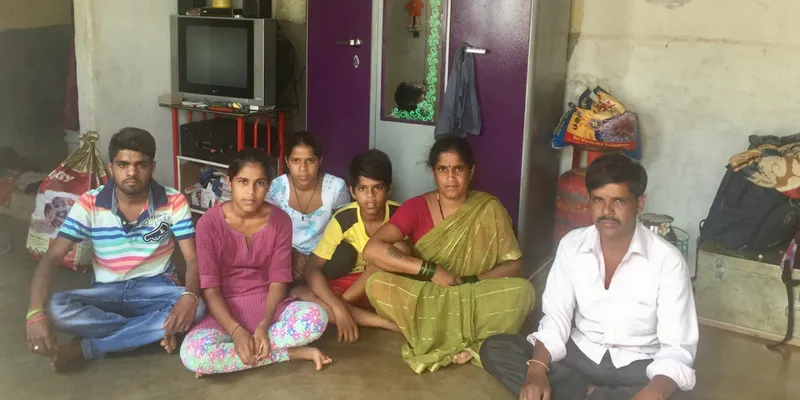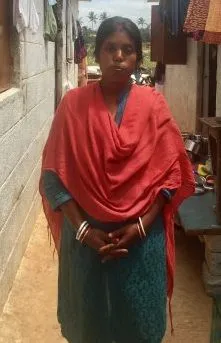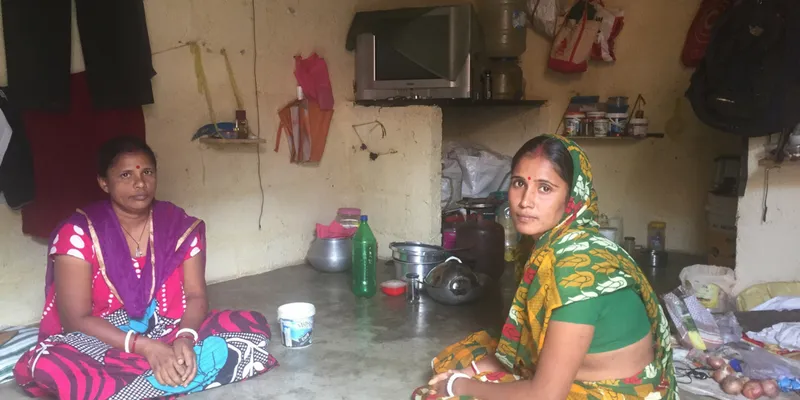'Our lives are all about hard work and paying rent', The woes of migrant women in Bengaluru
They take up jobs in the unorganised sector, have no proper identifications and lead displaced lives. They are voiceless and vulnerable. We chronicle a few stories and ask why is enough not done for them?

I meet Honamma in a one-room shed that serves as her home in Jakkuru, on the outskirts of Bengaluru. She greets me, rolls out a humble charpai and then introduces me to her six-member family. She is shy at first, but on gentle prodding, tells me her story.
Twenty years ago, the familyleft their village near Devdurga in Raichur district in search of greener pastures. Repeated drought, crop failure and debt forced them to move to Bengaluru in search of better wages.
In the beginning, Honamma and her husband took up daily wage jobs at construction sites in the sprawling suburbs of Jakkuru and surrounding areas that were seeing the rise of sprawling townships. Honamma earned about 120 rupees a day from what she calls “garre kelsa” (house work) at the construction sites of various apartments. “But it was backbreaking work. Often we had to carry heavy loads across many floors which left us with severe bodyache,”, she says. Despite stringent equal pay legislations, jobs in the unorganised sector still follow unequal pay structures for men and women.
We have three school-going children. My elder son also takes up odd jobs to contribute to the family income. But even our combined earnings are not enough to pay expenses like rent, schooling and medical costs. There are times when my husband is out of work and my son and I don’t get our wages on time. We don’t have money to even buy groceries. Last Sunday was one such day when the entire family slept hungry, she adds.
Displaced in their own state
Being a migrant in a rapidly-developing city like Bengaluru has left many like Honamma helpless. Having no credible documents to her name, she and her entire family depend on the papers of their eldest son to avail even basic facilities like a gas connection. “The bank turned me away when they came to know I have no appropriate papers to prove my identity. The ration card and voter ID carry my village address. We are unable to avail gas subsidy as the procedure is complicated in cities,” she complains.
Though Bengaluru has largely been hospitable to Honamma’s family, they still face issues such as payment delays and difficulty in renting houses, typical problems most migrants face. “We have four kids, and because of that, owners are not willing to rent out houses to us. The owner of our previous shed shooed us away in just a week because he felt we were consuming a lot of water”, Honamma says, explaining how it took them three months to find their current accommodation.

Many migrant women also live in constant fear worrying for the safety of their teenage daughters who commute long distances to school. Many find it difficult to cope in English medium schools and drop out, choosing to contribute to the family’s income.
Read More-
Quenching thirst and poverty in cities, with sugarcane juice
The plight of Lambani migrants of North Karnataka tells a sad tale
A taste of UP in namma Bengaluru: life and times of golgappa sellers
Leaking roofs, zero savings and high rents
It starts to rain heavily and Honamma’s younger daughter Annapurna rushes to place a wooden log at the small entrance of the shed to stop rain water from gushing in. “Our shed leaks every time there is a downpour. It’s pathetic when we are woken up to a dripping roof in the middle of the night,” says Honamma with a dejected look on her face. The green suburbs of Jakkuru also pose the threat of snakes who frequent the migrant residences. Lack of proper street lights make it worse for children who use common toilets after dark.
Life is merely about sustenance for many migrant families who hardly manage any savings.Unexpected medical emergencies are the worse according to Honamma who took a loan of five thousand rupees when her eldest daughter Renuka was hospitalised for typhoid last month.
Ideally we would like to save and send money home, but our lives are caughtbetween working hard and paying rent every month. Everything takes a backseat in this endless process,' added Yelamma, Honamma’s sister-in-law who also migrated to Bengaluru many years ago in search of an improved livelihood.
Serving in various roles

Of the many migrant women I spoke to in the suburbs, most of them were either from villages across North Karnataka or from the Sundarbans region in West Bengal. On further research I found that 200 Bengali families were living in sheds and hutments across Jakkuru itself. It was surprising to note the sheer scale of these mass migrations from the Sundarbans delta alone.
Twenty-five-year old Shobitha followed her husband Ranjith when they decided to migrate a year ago. They left behind their rented plot of land in the Sundarbans which had suffered crop failure due to repeated flooding. The saltwater of the region render most of the land unfit for cultivation. With no work to sustain themselves, they followed hordes of other villagers from the Sundarbans who moved to Bengaluru’s rapidly expanding outskirts for they promised more money and savings.
Unlike migrant women from North Karnataka who take up tedious daily wage work at construction sites, migrants from the Sundarbans usually prefer to work as housemaids or painters. “I have no problems in Bengaluru because I never felt like an outsider here. In fact, I love this place as we manage to earn more,” explained Shobitha, who with her husband manages to save up to 12 to 13 thousand rupees a month.
However, people like Shobitha are not welcomed by migrants within Karnataka. “These people steal most of the housemaid work because they are ready to work cheap,” says Lakshmi, another migrant womanwho shares ashed next to Shobitha and Honamma.
Unorganised jobs support impoverished lives
Lakshmi, a mother of three small children curses her fate and shares how she juggles different duties everyday to make ends meet. Lakshmi’s case is similar to scores of other women who end being up associated migrants in metros due to marriage.
Though our family owns land in Tumkur, we can’t cultivate it because my husband is physically challenged and I don’t have the confidence to manage farm work alone. Hence, I chose to be a housemaid, as it provides me more time to handle domestic chores, she explained.

Taking up unorganised sector jobs also mean that these migrant women have no forum to air their grievances. Some end up with meagre earnings while others manage to save enough. But it can’t be ignored how double displacement (both in terms of internal migration from rural areas and lack of identity at the workplace) leaves most of these women voiceless and vulnerable.
They might fit into the city rubric just fine, but are metros like Namma Bengaluru ready to handle such large influxes of migrants into the unorganised sector? Are our municipalities sensitive to address migrant woes? Is our Census system equipped to record their contributions? The citizens and the city awaits an answer to these pressing questions.







